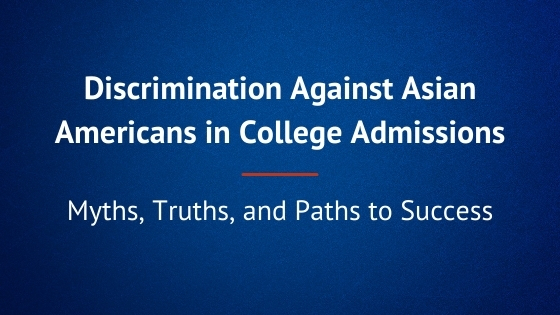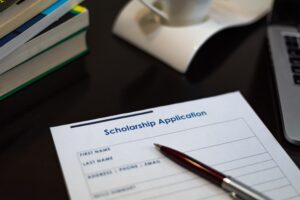Asian American parents and students often come to us with concerns about the admissions process. There is a common perception that being Asian hurts a student’s chances of being accepted into a top school, one which has only become increasingly discussed due to recent lawsuits against Harvard and Yale which allege the same thing.
Students and parents should not despair, however. Around 6% of America’s population is Asian, and around 20% of students at top colleges are Asian. It is clearly possible for Asian students to succeed, and in this guide we’ll break down myths about their paths to success, and some truths about how the process can pose unique challenges to Asian applicants. We’ll also investigate some of the research which has been done on this topic. While it is true that there are difficulties associated with applying as an Asian American student, it is still possible for them to succeed in their admissions journey.
Myths and Truths About Asian American Admissions
Myth: All Asian applicants are seen as the same
The most common concern we hear from students and parents is that they are too “stereotypically Asian” and that colleges won’t value their accomplishments. They worry that their student’s interests in STEM, choices of extracurriculars, and academic performance make them too similar to other candidates.
There is a wide variety in what it means to be interested in STEM, and in what it means to be Asian. Students can be in love with math, build robots for battlebots or other competitions, or program apps in their free time and fall under the umbrella of STEM. A student’s interest in the subject overall isn’t what makes them unique or common, it’s how they express their interest that colleges care about.
What it means to be Asian is also widely varied, as students with heritage from dozens of countries are all lumped into the umbrella term of “Asian.” While there is no differentiation in checking the box, in holistic admissions many colleges do consider the difference between Thais and Chinese, Laotians and Hmong. Top colleges know there is more to a student than an ethnic label.
Unfortunately, many schools still lump all Asian-American students together when making admissions decisions, instead of factoring in the different factors faced by different subgroups. A study by a group of University of Wisconsin professors found that Pacific Islanders were much more likely to attend 2-year institutions as opposed to 4-year when compared to Asian Americans as a whole. While more leite schools will take ethnic background into consideration, not all schools will.
Truth: All students can be seen as bland
While Asian students often worry a great deal about being seen as an undifferentiated mass, it is a problem which can and does impact students regardless of background. The problem isn’t just what activities a student participates in, but how they relate to these activities and discuss them.
Students need to demonstrate passion and drive through their activities, and their essays are a good place to demonstrate their personality, passions, and character. There are few truly unique activities, though some are more common than others. In order to stand out in a common activity, students need to relate to it and discuss it in an uncommon way.
This affects Asian students as well, but students of all backgrounds will find success if they demonstrate how they are unique and interesting people. It is fine for students to participate in “stereotypical” or “common” activities, like math olympiad or playing the violin. They should, however, both relate to their passions for these activities in unique and interesting ways and excel in the activities they choose to pursue if they want to be competitive for admissions.
If you are an Asian-American student who is dedicated to the violin, and excel in its performance, by no means should stereotypes prevent you from pursuing it. If your relationship is less intense, and violin and electric bass stir your interests and abilities equally, electric bass will help you stand out more. This is true for non-Asian applicants as well, though implicit bias does hurt Asian-Americans more in this regard. While most of the evidence of this is anecdotal, many news reports have shown how implicit bias on the part of admissions officers can hurt Asian applicants who are seen as stereotypical.
This does not mean you should discard opportunities that are stereotypical, but make sure you are passionate about and talented in the activities you choose to pursue; and if all options are equal, choose the one which helps you stand out more.
Myth: You have to/absolutely cannot write a personal statement about identity
These are a pair of related, competing ideas. The first is that Asian American students need to address their identity in the personal statement, the other is that they absolutely cannot. The discussion of personal identity is one of the possible topics for a personal statement, but is by no means a requirement for Asian American applicants.
The point of a personal statement is to let admissions officers know how you think, and what your passions are. This means that there aren’t any solid rules for what to write about, or any clear “right” or “wrong” topics.
Students should write about their identity if they feel it is core to their character, and they have a strong story to tell about it. Maybe they learned a language to connect with their grandparents. Maybe they connected to their history by learning to play a traditional instrument, or to dance in the style of their culture. So long as the essay discusses who the student is, and helps admissions officers get to know them as a person, it will have done its job.
Students shouldn’t write about their heritage or identity just for the sake of writing about it. They should find the story that best represents them, and tell it as best they are able. At its best, a personal statement tells admissions officers something they wouldn’t otherwise know about the student, and opens a window into their heart and soul.
Myth: Schools have quotas to maintain diversity, and this hurts Asian applicants
The use of quotas in admissions is explicitly illegal, and while many schools do consider race in admissions, the amount of weight they give it is limited as well. While there are lawsuits alleging that the consideration of race in admissions hurts Asian American applicants unduly, this has not been proven.
There is evidence that Asian American students may be hurt by implicit bias on the part of some admissions officers, but this is not an institutional failing, though the problem may be systemic.
There is evidence that Asian students with high grades or test scores often get rejected, but this is due to colleges wanting more than grades alone. High grades are the baseline, and thousands of students with perfect grades are rejected each year in favor of students that schools deem more interesting. It is hard to quantify how these softer criteria are weighed, so most of the focus in these discussions is on hard numbers; grades and test scores.
There is a chart that circulates widely on the topic, comparing admissions chances for students in different ethnic groups; and measuring the change in terms of equivalent points on standardized tests. Here is the chart, from Epenshade and Radford’s 2009 book:
At first glance this chart seems damning, but a number of factors contribute to the score disparities and corresponding increase or decrease in admissions chances seen. Indeed, while many people’s gut reaction is to eliminate consideration of race, this does not help equality as much as many predict it will.
Truth: Asian Applicants are not unduly hurt by race-conscious admissions
Students are judged relative to their peers with similar backgrounds from the same region. All students from a region (a state, or portion of the country) are read by the same admissions officer, and judged relative to others with similar circumstances. How granular these divisions are can vary based on the college in question, but students will be compared to those that are like them.
While most colleges do consider race, many also judge students on economic hardships they have overcome. This is especially true for the UC schools, which are not allowed to use race in admissions decisions. Therefore, students who have faced economic hardship will be credited more for their academic success.
When the UC system originally decided to stop considering race in admissions decisions, many Asian-American advocates hailed the decision. The increase in enrollment by Asian-American students at UC schools has been illustrated as a vindication of this. Enrollment is not the best measure of a policy’s success however, instead, raw admissions data should be used. The data from UC schools was compiled and analyzed in a paper by professor OiYan Poon, resulting in this chart:
This chart shows a sharp decline in the percentage of Asian-American students accepted by all schools in the UC system, except UC Riverside. The trend begins after the passage of the law banning race conscious admissions in 1996. While the absolute number of Asian-American students in UC schools has gone up, it has decreased when compared to the number of Asian American students who apply.
Truth: Legacy and athlete admissions considerations hurt Asian students the most
Asian students are not hurt by affirmative action policies overall, and some groups benefit strongly from them, including Hmong and Pacific Islanders, according to a study by professors Julie Park and Amy Liu. So what is depressing acceptance rates for Asian American students? We saw how implicit bias can hurt their chances above, but another major factor is how athletic recruiting and legacy status are weighted by colleges.
In Epenshade and Radford’s 2009 book, they examine admissions data from over 60,000 students who applied to 6 top schools in 1997. They found that Asian students were least likely to participate in athletic extracurriculars, while White students were most likely:
This means that when student athletes are recruited by colleges, and receive the corresponding major boost to admissions chances, it is White students who see the most benefit, especially at top schools, while Asian students see the least. While the book does not have a similar chart to track legacies, due to privacy concerns for the universities studied, the impact of legacy admissions disproportionately favors white and well-off students.
Indeed, this is how the authors suggest ameliorating racial inequalities. By maintaining Race-conscious admissions, but removing legacy weighting for applicants and giving that same weight to economically disadvantaged students. Their projected outcomes from this approach are shown in a chart here:
In further analysis, they find that the groups which would benefit the most from this arrangement would be lower and working class White and Asian students. These analyses are not covered by many of the sites which include other tables from the books, as they do not support the conclusions they want to draw.
From these, we can see that one of the best ways to close the admissions gap seen by Asian-American students compared to their White counterparts is to eliminate the admissions weight given to legacy students and athletic recruits.
Final Thoughts
Many students and parents believe that it is more challenging for Asian American students to get admitted to top schools, and it is when looking at populations as a whole. Due to the secretive nature of the admissions process, however, it’s hard to be certain about why any individual student is admitted or rejected. While it might seem easy to blame a rejection on another student taking “your” spot, this does not reflect the reality of the process.
There is evidence to support claims that it is harder for Asian American students to get into top colleges, and some evidence on how structural changes may be able to counteract these barriers. If you have concerns about this, or any other concerns about the admissions process, don’t hesitate to reach out to us. Ivy Scholars’ founder and CEO, Sasha Chada, has personal experience with this issue, and all our mentors are eager to guide parents and students through every step in the admissions process.








